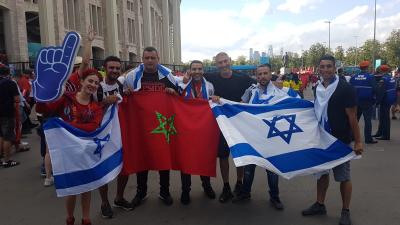
RĂ©pondre au commentaire

Israel: The second largest Moroccan diaspora in the world
Op-ed: The cooperation between Israel and Morocco generates the 'routinization effect'—the frequent contacts between the two countries helps make the Moroccan public more used to and less sensitive towards signs of public cooperation, gradually stretching the boundaries of cooperation.
Einat Levi| - YNet News
The World Cup in Russia generated unique images in the Israeli media related to Israel-Morocco relations. Fans of the Moroccan national team and Israeli football fans who attended the tournament posed for joint photos and were publicly speaking warmly about each other on. These images were very different from interactions between Israel and its Arab neighbors that we usually see.
This can be attributed to the Moroccan perception that sees the Moroccan Jews living in Israel as part of the Moroccan Diaspora. This perception in grounded in a report issued in March 2016 by the Moroccan Ministry of Diaspora, in which Israel was mentioned as the second largest Moroccan Diaspora after France, with about 800,000 Moroccans. This issue has also been raised in Moroccan public discourse over the question of the right of the Moroccan Diaspora to vote for parliament, and if so, does this right apply to Moroccans living in Israel.
In addition, an Israeli citizen of Moroccan origin who wants to obtain Moroccan citizenship can do so because the right to Moroccan citizenship applies by filiation up to fourth generation descendants. Not only that, in July 2011 an amendment was introduced to the Moroccan constitution, in which Judaism was mentioned as part of Moroccan heritage. Where else can we find a Muslim country that views Israel as one of its Diaspora, recognizes Judaism as part of its heritage, and even offers citizenship to some of its Diaspora there?!
Beyond the Jewish heritage that lasted for more than 2,000 years in Morocco, the Israeli-Moroccan friendship began in the late 1950s with security cooperation and a need to regulate the immigration of Jews from Morocco to Israel. In the 1970s, relations continued to develop thanks to Moroccan mediation throughout the peace process between Israel and Egypt. In the early 1990s, following the signing of the Oslo Accords, relations between the countries improved significantly and became overt. In 1994, liaison offices were opened in Rabat and Tel Aviv, but since October 2000—following the second intifada—Israel and Morocco do not have official diplomatic relations any more.
Nevertheless, there are many surprising types of cooperation that do take place between the two countries. For example, approximately 45,000 Israeli tourists visit Morocco each year. The number of Moroccan tourists visiting Israel is much lower, and is estimated at about 3,500 a year, also due to difficulties in obtaining visas to Israel. Significant, albeit limited, cooperation can also be found in agriculture. Morocco supplies Israel with agricultural produce such as sardines and olives, while Israel supplies Morocco with professional knowledge and technological equipment. Morocco also attracts agricultural entrepreneurs because it does not impose agriculturally-related taxes and even provides subsidies. In this context, some Israeli farmers established farms in Morocco and are growing almonds, dates, olives, and citrons there.
However, the most striking cooperation takes place in the civil sphere, and is reflected in the exchange of delegations, the preservation of the Jewish-Moroccan heritage, festivals and music events, cinematic creations taking place in Morocco and Israel, cross-border research, student exchanges, and more. In June 2018 alone, three Moroccan civil society delegations arrived in Israel, joining a long list of delegations from Morocco in recent years. Similarly, Israeli delegations visited Morocco in recent years on various occasions, such as the International Climate Conference held in November 2016 in Marrakesh (COP22); The Judo Grand Prix competition that took place last March in Agadir; The Mediterranean Parliamentary Assembly held in the Moroccan Parliament in Rabat in October 2017, a study tour conducted by the Maoz Organization for Leadership Development.
The cooperation between Israel and Morocco takes place despite movements in Morocco that support the Palestinian cause and call to boycott Israel. These movements, that influence Moroccan public opinion through the media and social networks, operate within the professional unions and mobilize the Moroccan public for protest. For example, they led protests against the activity in Morocco of the Israeli shipping company ZIM, and against the selling in Morocco (especially during Ramadan) of Israeli-made Majhul-type dates. These protests have had limited success to date. They do not prevent cooperation altogether, but limit it and prevent Israel and Morocco from realizing the full potential of their relations.
The multi-facet cooperation between Israel and Morocco, along with the mutual interest expressed by civil societies in both countries, attest to the great potential for cooperation that has not yet been realized. Progress in the Israeli-Palestinian peace process will enable Israel and Morocco to move forward in their relations, as they did in the past.
Until that happens, the two countries should continue to develop their unique relationship, which is so different from Israel's relations with other countries in the region. The hugs between the Israeli and Moroccan fans in the World Cup give room for cautious optimism and indicate that there are real opportunities in Israel-Morocco relations that can be pursued, even if not all of them can be implemented in the current regional reality.
The Israeli-Moroccan relations are more than just relations between two countries, these are relations between a country and its second largest Diaspora.
Einat Levi is a researcher at the Mitvim Institute, and a member of the institute’s task-team, which explores Israel’s relations with key Arab countries. This article is based on a study of Israel-Morocco relations written as part of a Mitvim Institute project, “Israel’s relations with Arab countries: The unfulfilled potential”.
